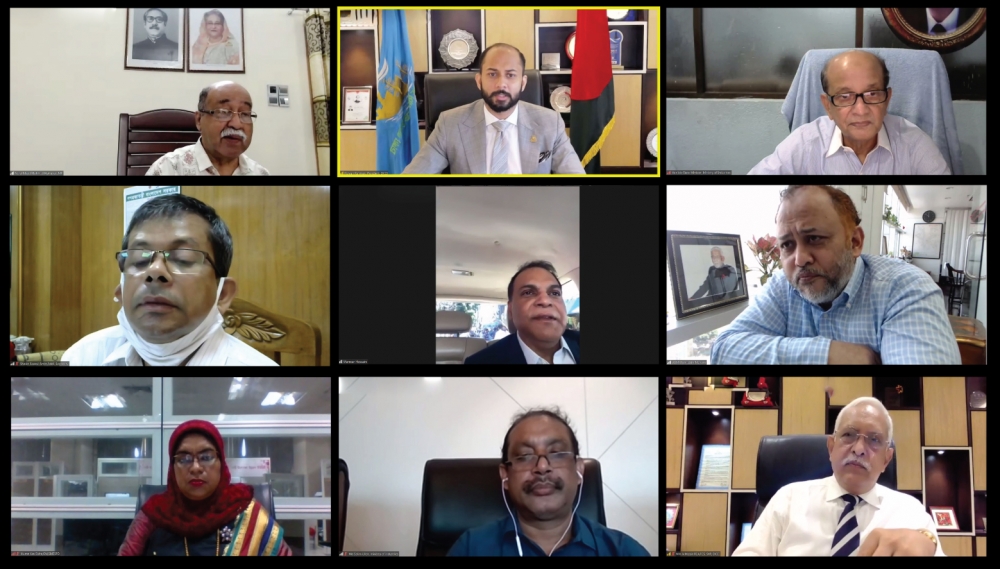News
Webinar on “Private Sector Expectation in the Proposed National Industrial Policy-2021”

Product diversification, skill development, policy reforms, private sector-led economic transformation, technology adaptation, adequate training and SME development, protecting domestic market, facilitating import substitute industry, redefine SME, cluster development and participation of women entrepreneurs are some of the areas the industrial policy should focus to create a vibrant private sector in the country to compete in the international market even after the LDC graduation. Speakers focused on these areas at the webinar on “Private Sector Expectation in the Proposed National Industrial Policy-2021” organized by Dhaka Chamber of Commerce & Industry (DCCI) held on September 12, 2021. Industries Minister Nurul Majid Mahmud Humayun, MP and State Minister for Industries Kamal Ahmed Mojumder, MP joined the webinar as the Chief Guest and Special Guest respectively.
DCCI President Rizwan Rahman in his opening remarks urged for redefining the definition of SMEs to ensure adequate access to finance and policy support to the small and cottage industries. He also suggested that, Bangladesh can follow example of Vietnam to prepare a comprehensive industrial policy. He opined that research and development, innovation and e-commerce can play a vital role in future and government should address these sectors properly in the policy. He also mentioned that, after LDC graduation Bangladesh will have to face competition in the global export market due to lack of product diversification. In this regard, signing FTA with potential countries and enhancing trade negotiation skills of the country are very crucial. He also said that the moratorium period for the loan for SMEs should be extended.
Nurul Majid Mahmud Humayun, MP, Minister for Industries said we will be able to reach 40% contribution of industry to GDP. This government is industry-friendly and before formulation of industrial policy we did consultation with the private sector. Coordinated efforts needed to implement one stop service of BIDA. Moreover, coordinative efforts of public-private sector to create employment opportunities, establishing skilled backward and forward linkage industry, expansion of domestic industry. Government is planning to create skilled human resources in the ICT sector of Bangladesh to curb the benefits of 4th industrial revolution, he further added. SME is the lifeline of our economy and they should get maximum facility either in fiscal or non-fiscal format.
State Minister for Industries Kamal Ahmed Mojumder, MP said protection of domestic industry, product quality, increase productivity, IPR management, proper definition of SME, setup cluster based industrial park, sustainable industrialization and necessary policy reforms & infrastructure development will be considered for the next industrial policy as these are key to boost local and foreign investment in the country. Moreover EZs, industrial parks, cluster based industrial zone, one stop service will be established in the comparatively underdeveloped areas.
Md. Salim Ullah, Senior Assistant Secretary (Policy), Ministry of Industries presented the keynote paper. He said that we need to take measures for import-substitute industrial development. To attain the goal of becoming a developed nation, export-oriented industrialization will foster economic transformation. He said that, the industrial policy will focus on how to increase the contribution of industrial sector to GDP from 35% to 40% as well as reducing poverty and unemployment by creating skilled manpower for industrial sector. Product diversification of potential exportable items, capacity building of industrial sector to face the challenges after LDC graduation will also get special attention in the next policy.
Sheikh Faezul Amin, Additional Secretary (Policy, Law and International Co-operation), Ministry of Industries said expansion of business, fostering private sector, sustainable industrial sector, 4IR challenge, technological advancement, one stop service for private sector, vocational training, facilitating women entrepreneurs, increasing productivity will get priority in the industrial policy.
Husne Ara Shikha, General Manager, SMESPD, Bangladesh Bank said there should be specific definitions of cluster and startup included in the industrial policy. Manufacturing and service sector are already included in the Industrial policy but Trading is not included. Micro merchants should also be included in service industry sector. Industry contribution to GDP is 35% out of which only 9% comes out of large industry, the rest comes from SMEs. Bangladesh Bank has been facilitating women entrepreneurs at its best capacity with best possible policy assistance.
Manwar Hossain, Group Managing Director, Anwar Group of Industries said policy should have a focus not only on overall industry but every individual industrialist or manufacturer. Stability of policies is very much needed to progress, he said. We should concentrate where we have strengths. If we arrange skill development measures and training for the migrant workers then they will have more capacity to contribute to the national economy.
ASM Mainuddin Monem, Managing Director, Abdul Monem Limited urged for aggressive product diversification and technological advancement. He said after LDC graduation, cost of production will be increased so we have to address this issue. Regarding land policy he said that it is not very friendly enough and urged for reforms especially for EZs. In the motorcycle industry of Bangladesh, 13 parts out of 22 are being produced in Bangladesh now. a target oriented, time bound EZ management is necessary, he added. He further requested the government to finalize at least 10 EZs out of 100 with focused fiscal incentives, quick infrastructure development and utility connections. Finally he said that we have to embrace the technology.
DCCI Senior Vice President N K A Mobin, FCA, FCS gave vote of thanks.
Published on: 2021-09-12
